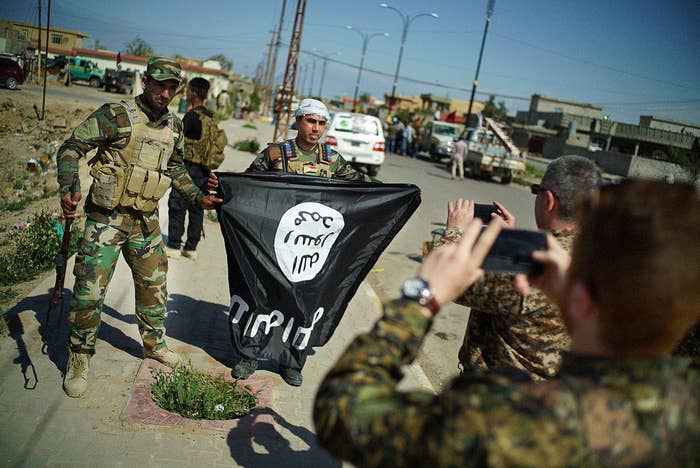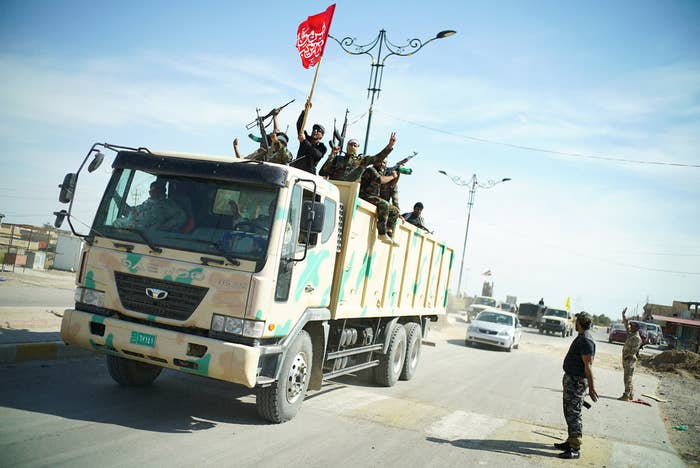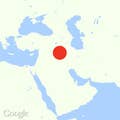
BAGHDAD — The man embedded with the battalion of Iraqi fighters was not Iraqi. His accent placed him someplace else. He spoke privately about his nationality — from another country in the region — and the organization that sent him to Iraq. But he agreed to talk on the condition that this information be withheld because he wasn't authorized to speak to the press: "Call me a non-Iraqi fighter with the popular mobilization in Iraq."
Sitting down for an interview near a front with ISIS on a recent afternoon, he predicted that ISIS will be defeated in Iraq. And when it is, he said, the ultimate winner from the conflict will be Iran. "The American project in Iraq is headed toward defeat," he said.
The man was working with one of the Shiite militia groups that have risen up to fight ISIS under the banner of "popular mobilization" forces. Middle-aged, he appeared less a fighter than an adviser, keeping to the background and conversing with commanders. The battalion was busy securing some recent gains. "The U.S. said the fight against ISIS will take years to win, but the popular mobilization is making it happen quick," he said.
The role of the militia in the war on ISIS has expanded in recent months. They have two main sources of foreign support: Iran and its key ally in Lebanon, Hezbollah. Officials from both have acknowledged their involvement. Iran has provided training and weapons, while both Iran and Hezbollah have sent military advisers to the front.
Some U.S. officials have expressed alarm over the increasing influence of militia groups backed by two entrenched rivals. At the start of the recent offensive against ISIS in Tikrit — the largest to date — the militia accounted for some 20,000 troops, according to Gen. Martin Dempsey, the U.S. chairman of the Joint Chiefs of Staff. The fading Iraqi military — meant to be a legacy of the U.S. occupation — numbered just 3,000.
The fighter viewed the strength of the militia — which includes groups that once fought U.S. troops with assistance from Iran — as a decisive blow in the power struggle between Washington and Tehran. Three years after the end of the Iraq War, he said, U.S. influence in the country is fading as Iran takes on a more assertive role on the battlefield. "This will destroy the American project in Iraq," he said. "The popular mobilization's numbers as a skilled, armed guerrilla force — this will be a major problem for U.S. plans."

The militia reportedly numbers around 100,000 fighters across the country. They rose up following a call from Iraq's top Shiite religious authority in June as ISIS militants — who preach an extremist version of Sunni Islam — took the northern city of Mosul and threatened Baghdad. The Iraqi military had retreated in Mosul, leaving its U.S. weapons behind, and the Obama administration held off on launching airstrikes until August, when ISIS advanced into the Kurdish region in northern Iraq. "The Iraqi people thought America would be their number one supporter in defeating ISIS. But ISIS came close to the border of Baghdad, and the U.S. did nothing to intervene," the fighter said. "Iran and [its allies] are sacrificing blood and everything else. Who do you think the Iraqi people will choose?"
The fighter said that it would be not the U.S. strikes but the assistance of Iran and Hezbollah on the ground — and the strength of the militia — that brought ISIS to defeat. "Instead of participating, you see headlines that the U.S. conducted three airstrikes, that the coalition conducted five airstrikes. Such things will not make anyone pregnant," he said. "At the conclusion to a war, those who control the ground have the right to impose their decisions. The military reinforces the politics."
He added: "The status of America is less than before. Now it's trying to find a role for itself in the end of ISIS."
Iran and Hezbollah have been instrumental in propping up another regional ally, the Assad regime in Syria, amid a civil war that has inflamed historic sectarian divides. The fighter blamed the U.S. for supporting Sunni rebel groups in Syria, lumping them together with ISIS even though many have warred with the extremists. He said the same struggle was playing out in Iraq — and that the faith of the militia gave them the upper hand.
"Besides failing to create a new army in Iraq, the Americans failed to create a dogmatic army, an army that believed in a creed," the fighter said. "Yeah they gave them weapons and training, but they failed to give them a creed."
Asked the creed of the militia, he replied: "To defend the sect of the prince of believers," a reference Ali ibn Abi Talib, the first imam of Shiite Islam.
"The American project fears this creed," he said.

